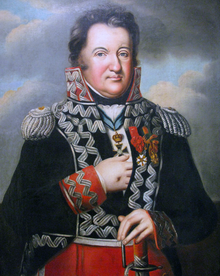Jan Henryk Dąbrowski
Jan Henryk Dąbrowski [ˈjan ˈxɛnrɨk dɔmˈbrɔfskʲi] (also Johann Heinrich Dombrowski ; born August 29, 1755 in Pierzchowice , near Cracow ; † June 6, 1818 in Winna Góra , municipality of Środa Wielkopolska , Grand Duchy of Poznan ) was a Polish general . He is revered as a Polish national hero.
Life
Dąbrowski grew up in Hoyerswerda as the son of Electorate Colonel Johann Michael Dąbrowski (Dombrowski) and served in the Saxon army from 1772 to 1792 , then took part on the Polish side under Stanislaus Poniatowski in the Russo-Polish War of 1792 against the Russian invasion in Poland-Lithuania and the Targowica Confederation .
During a national uprising under the leadership of Tadeusz Kościuszko against the Second Partition of Poland and the political incapacitation by the Russian Empire , Dąbrowski was the commanding general . On October 2, 1794, he occupied Bromberg after defeating a Prussian corps in the Battle of Bromberg . When the uprising collapsed, Dąbrowski retreated to Greater Poland. Prussia did not allow him to move to France with the remnants of his troops .
After 1795 he joined the political association Agencja . In 1796 Dąbrowski followed Józef Wybicki's call to France and in 1797 organized military associations of Polish volunteers to protect the newly founded Cisalpine Republic . Like the Danube Legion of General Karol Kniaziewicz, this legion placed itself in the service of the French Republic . The aim of the Polish generals was to march into former Polish areas with the help of Revolutionary France and to liberate them. The partitions of Poland by Austria , Prussia and Russia should be reversed and Poland should be resurrected. In reality, the French Republic used the Polish Legion as a foreign regiment for its own purposes, for example in Napoléon's Italian campaign.
Dąbrowski became a member of the Freemasons ' Union in Italy , his lodge belonged to the Grande Oriente d'Italia . On January 8, 1808 he was a founding member of the Loge Français et Anglais Réunis in Poznan . He was also an honorary member of the Piast lodges in Posen and the wreathed cube in Gnesen .
In the army of the new Duchy of Warsaw he led the command and took part in the Russian campaign in 1812 and in the campaigns in Germany in 1813 . Initially commander of a Polish division, after Poniatowski's death he became commander-in-chief of the entire Polish army.
After the end of the duchy through the Congress of Vienna , he organized the new Polish army as general of the cavalry under Tsar Alexander I , the new king of Congress Poland. In 1816 he quit his service.
Dąbrowski plays the main role in the text of today's Polish national anthem . The hymn was written by Józef Wybicki , who also went to Italy , as a song of the Polish legions in Italy. She expresses the desire that Dąbrowski lead them back to Poland and let the fatherland rise again with them.
Honors
- His name is entered on the triumphal arch in Paris in the 25th column (DOMBROWSKY).
- During the Second World War , the 2nd Infantry Division of the Polish Armed Forces in the Soviet Union ( 2 Warszawska Dywizja Piechoty im. Henryka Dąbrowskiego ) was named after him. She was involved in the liberation of the Majdanek and Sachsenhausen concentration camps .
literature
- Constantin von Wurzbach : Dąbrowski, Heinrich Johann . In: Biographisches Lexikon des Kaiserthums Oesterreich . 3rd part. Typogr.-literar.-artist publishing house. Establishment (L. C. Zamarski, C. Dittmarsch & Comp.), Vienna 1858, p. 124 f. ( Digitized version ).
- Friedrich August Koethe, Friedrich Arnold Brockhaus, Contemporaries: Biographies and Characteristics , Digitized
Web links
Individual evidence
- ^ Friedrich CA Hasse, Contemporaries, Leipzig 1830
- ↑ Brockhaus, 1832
- ↑ Ludwik Hass: Wolnomularze polscy w lożach Zachodu: dwie pierwsze dekady XIX wieku, w: Ars Regia 7/8, 13/14, 1998–1999, s. 150.
- ^ Robert A. Minder: Freemason Politicians Lexicon, study publisher; Innsbruck 2004, 350 pages, ISBN 3-7065-1909-7 ; P. 215
- ↑ Forgotten Polish liberators: Hania Szelewicz (Hania's battle name for Anna) and Anna: "Majdanek, that was the point why we fight! So that this damn Hitlerian machinery is smashed!" VVN-BdA
| personal data | |
|---|---|
| SURNAME | Dąbrowski, Jan Henryk |
| BRIEF DESCRIPTION | Polish general |
| DATE OF BIRTH | August 29, 1755 |
| PLACE OF BIRTH | Pierzchowice, near Cracow |
| DATE OF DEATH | June 6, 1818 |
| Place of death | Winnogóra, at Wronki |

